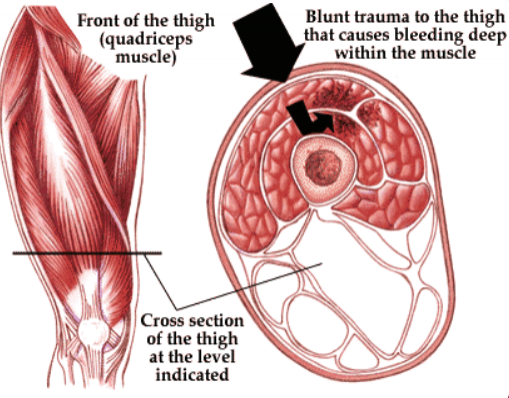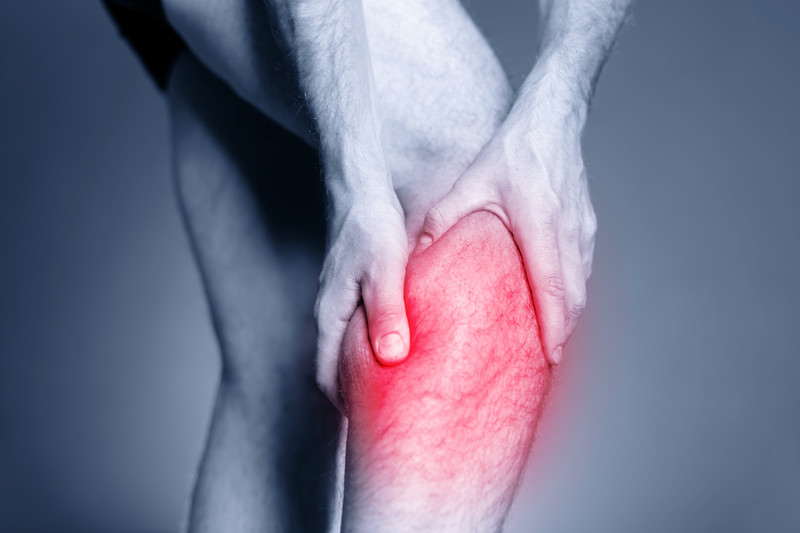What is a Muscle Cork and How to Manage It
By Physio, Sarah Bombell
What is a muscle cork (medically called a “muscle contusion”)?
 Muscle contusions or “corks” can occur from a direct blow to the muscle which is common in contact sports. The compressive forces on the muscle causes damage and bleeding within the muscle tissue. This damage can be contained within the sheath surrounding the muscle (intramuscular) or can cause tearing of the muscular sheath (intermuscular)
Muscle contusions or “corks” can occur from a direct blow to the muscle which is common in contact sports. The compressive forces on the muscle causes damage and bleeding within the muscle tissue. This damage can be contained within the sheath surrounding the muscle (intramuscular) or can cause tearing of the muscular sheath (intermuscular)
This type of contusion occurs when the sheath that surrounds the muscle tissue stays intact. The sheath is a think layer of connective tissue that encases muscles. With this intact the bleeding within the muscle often stops early due to the increase in pressure within the sheath, however this increase in pressure will drastically reduce the function of that muscle. As the bleeding is confined within the muscle, there may be little or no bruising. Stretching or contraction of the muscle will be quite painful and full recovery can 1-4 weeks depending on the extent of damage of the muscle tissue.
Intermuscular
This occurs when the sheath surrounding the muscle tears allowing the blood and swelling to escape the muscle. Because of this it may take longer for the bleeding to stop, especially if there isn’t ice or compression applied soon after injury. Even though there may be extensive bruising, this type of contusion often resolves faster as the bleeding can be flushed away more easily.
Signs and symptoms
- Pain as a result of a direct blow to muscle
- May be swelling or bruising
- Pain with stretching
- Painful muscle contraction
- Pain to palpate or apply pressure to the injured site
Firstly seek professional advice as soon as able. This is necessary to rule out fracture of underlying bone and help guide you through recovery. As soon as possible after injury it is recommended to ice the muscle in a stretched position (as much stretch as pain allows). This will help stop bleeding and minimise the swelling within the muscle. For the first 24-72 hours post injury be sure to ice every 1-2 hours for 20 minutes if possible. Using compression garments or bandages as well as elevating will also help to minimise swelling. Relative rest is also important, meaning taking it easy performing your daily activities while respecting the pain. Complete rest is not advised as some gentle movement can help flush the swelling out of the muscle tissue. In this phase it is important to NOT drink alcohol, massage the area heavily or try to “run it off” as all of these will increase the swelling and trauma to the injured tissue.
Continued management
After 48-72 hours it is important to start to use the muscle gently. Swimming, cycling, walking and isometric contractions are best to start with. Again at this stage activity should be within painful limitations, however it is ok to push into some discomfort. Heat and massage may also be used following 72 hours.
Prognosis
Recovery is individual and should be guided by pain when gradually returning to full training. Generally intramuscular contusions have a worse prognosis than intermuscular. Research has shown that the recovery following quadricep (thigh muscle) contusions are as follows:
Mild Injuries – at 24hrs post injury able to bend knee >90 degrees = 13 days
Moderate Injuries – 24hrs post injury able to bend knee 45-90 degrees = 19 days
Severe Injuries – at 24hrs post injury able to bend knee <45 degrees = 21 days
Complications
If mismanaged a muscle contusion can result in myositis ossificans. This is the result of the body accidentally laying down bone building cells within the muscle tissue. After approximately 2 weeks there may be a tender palpable firm lump which can be visible on XRay. This formation of immature bone will have a detrimental effect on muscle function. Generally treated conservatively, over time the body will resorb the bony tissue, if this doesn’t occur surgical removal may be required.
If you have sustained a muscle Contusion injury and need specific management advice to get you back to Sport asap, come and discuss with one of our helpful Physio’s – phone 07 5500 6470 or Book Online for an appointment


